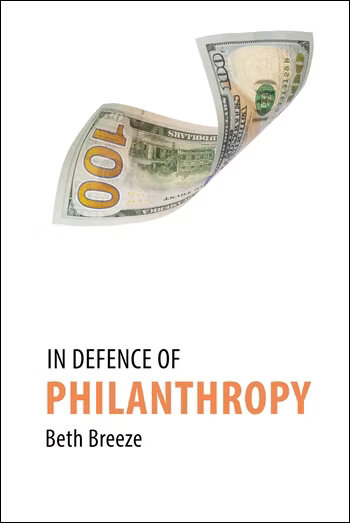In Defence of Philanthropy
Does philanthropy really need defending? While never explicitly asked, it’s the question that’s implied throughout Beth Breeze’s treatise In Defence of Philanthropy. You might wonder why this fundraiser-turned-academic feels the need to state, once and for all, what philanthropy is and what it isn’t, to counter notorious examples of bad apples with the concrete and long-lasting good that philanthropy brings, and to encourage space for more philanthropy, not less, as we look for long-term solutions to ever-greater challenges both local and global.
According to the latest report from Giving USA, Americans—individuals, foundations, and corporations—combined to give away $471 billion in 2020, a 5.1 percent increase over the 2019 total. And if the issues of climate change, vaccine development, or supporting historically underserved communities are any measure, philanthropic dollars are doing ever-bolder work. What’s more, even with volunteers staying home in these pandemic times, more people—wealthy or not—are giving more of their treasure than ever before. From that point of view, we just might be living in a golden age of giving.
But what of all those headline-grabbing rotten tomatoes hurled at philanthropy—that government tax dollars, not private wealth, should provide basic services; or that philanthropic plutocrats and their vanity are choking the public square; or that philanthropy needs to always be measurable and quantifiable, where in every way the most good must be done for the most people; or that philanthropy without an equity lens is inherently suspect? From the other side of the street, you don’t need to agree with the academic, insider, and populist critiques of Anand Giridharadas, David Callahan, or Jacobin magazine to feel that something is not quite right. Depending on the day, you should be forgiven for being a little unsure where you stand. That ambivalence, be it public, personal, or professional—is precisely why In Defence of Philanthropy is a welcome addition to the debate.
As director of the Centre for Philanthropy at the University of Kent, Breeze has spent more than a decade exploring the mechanisms that make for successful philanthropy, studying the how, what, and why of giving. Why do we call individual givers “donors,” reserving “philanthropist” for the millionaire or billionaire? Why do we quietly disparage those who give anonymously and celebrate those who give publicly, then so easily turn on public philanthropy as being self-serving and therefore disingenuous? Why do we mix debates over taxation with the giving of the mega-wealthy? It is nothing new to find fault with how philanthropy is practiced; one need only look to the McCarthy-era challenges to the independence of foundations. But we seem to be in a time of hypercriticism that Breeze suggests will have a long-term generational impact on giving—large and small—unless those denunciations are challenged and answered.
In his 2019 book, Giving Done Right, Center for Effective Philanthropy president Phil Buchanan asked many of the same questions raised by Breeze. How do we encourage people, the mega-wealthy and those with just a few extra dollars, to give more, and to give more purposefully? And how do we create a framework that allows the public to see and understand the value of philanthropy alongside larger public policy debates? (Their November 2021 conversation is a welcome synthesis of their thinking.)
Philanthropy is not simply a quick fix for our failure to spend public dollars on needed services. In its best framing, philanthropy is an expression of our values and our desire to improve ourselves, our community, and our society. Philanthropy exists so that we might experiment and find better solutions that, in turn, inform larger efforts to, in effect, repair the world.
Central to Breeze’s defense is the point that it has become all too easy to conflate arguments about inequality, equity, and justice, as though the sole purpose of philanthropy were to eradicate social and political inequities. For those who think that government must provide a more enduring and substantial social safety net, that more tax dollars must be directed to basic services, it is a small step to say that the wealthy need to pay more and it should be compulsory tax dollars, not volunteer philanthropic dollars, that pay the bills. For Breeze, the answer is: Yes, let’s have that conversation about taxes, but let’s not throw out the baby with the bath water. Philanthropy is not simply a quick fix for our failure to spend public dollars on needed services. In its best framing, philanthropy is an expression of our values and our desire to improve ourselves, our community, and our society. Philanthropy exists so that we might experiment and find better solutions that, in turn, inform larger efforts to, in effect, repair the world. As for the criticism that philanthropy is ineffective, Breeze counters that any insistence on one framework or one strategy or one outcome is little more than “philanthropic one-upmanship.” In fact, quite the opposite is true; in philanthropy “there is no perfect formula for working out how to be generous.”
The problem is that in our permanently-going-viral public discourse there is no space for nuance: All billionaires become evil, all philanthropy is a tax dodge, and all private funding is a morally bankrupt ploy to reinforce the capitalist system. These maximal claims are sticky, and even when we know not to argue from the specific to the general, it is far too easy to paint with a broad brush. Breeze is deeply concerned by the corrosive nature of these attacks, particularly as they affect future givers. Why engage in philanthropy at all when you run the risk of being tarred and feathered? This may be the golden age of giving, but how long can that last if the image of philanthropy is incessantly being tarnished? And how do we talk about philanthropy in a way that creates a meaningful critique instead of encouraging facile outrage?
Breeze is deeply concerned by the corrosive nature of these attacks, particularly as they affect future givers. Why engage in philanthropy at all when you run the risk of being tarred and feathered?
Breeze’s answer is for anyone who is serious about philanthropy to make a fundamental commitment to being accountable and transparent about philanthropy’s purpose and what it can and cannot do. And that requires improving the practice of philanthropy itself: being more ethical, collaborative, and informed by social, racial, and economic justice processes; being more flexible and less restrictive when it comes to funding; and being more effective by learning from grantees and championing their diversity. None of this will cool the heated rhetoric that stirs our national debates over inequality or racial and social justice, but if well practiced, it might just provide the armor philanthropy needs to flourish. Breeze wants “more people to give, and to give more thoughtfully.” To that end, we need to be prepared to work harder and be willing to push back against criticism that flattens the value of philanthropy and hinders its potential.
Daniel X Matz is foundation web development manager at Candid.







